
by Terry Melanson
March 8th, 2009
from
ConspiracyArchive Website
|
Pallas Athene (or Minerva to the
Romans), the goddess of wisdom, honored the owl as her sacred bird.
The owl was recognized as an emblem of penetrating sight and
intelligence.
It was considered to be a favorable omen if an owl was
spotted on the battle field or at times of crisis.
The Athenian
silver tetradrachm bore the owl (Athene noctua); and owls were
protected and thrived in great numbers at the Acropolis of Athens (a
temple dedicated to Athena). |
Pallas Athene (or Minerva to the Romans), the goddess of wisdom, honored the
owl as her sacred bird.
The owl was recognized as an emblem of penetrating
sight and intelligence. It was considered to be a favorable omen if an owl
was spotted on the battle field or at times of crisis.
The Athenian silver tetradrachm bore the owl (Athene noctua); and owls were protected and
thrived in great numbers at the Acropolis of Athens (a temple dedicated to
Athena).
The Bavarian Order of the Illuminati
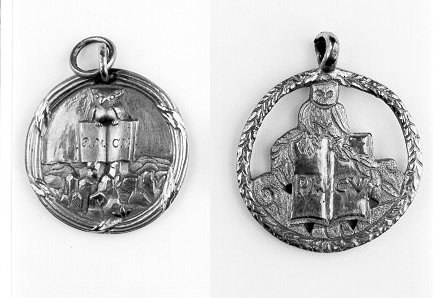
Minerval Seals of the Illuminati: two of three known to still exist. P.M.C.V.
stands for Per Me Caeci Vident (Through me the blind become sighted).
An owl
holding an opened book (signifying learning), surrounded by a Laurel wreath
(a symbol of learning or graduation);
Per Me Caeci Vident was a reminder to
the Superiors of the class, whose responsibility it was to properly instruct
the Minervals.
These medallions were worn around the necks of Minerval
initiates.
For a secret society called the
Order of the Illuminati - emulating the
ancient schools of wisdom, and having a "Minerval Academy" as a foundation -
would there have been a more fitting symbol than the Owl of Minerva?
The class of Minerval was a relatively low rank in the scheme of things.
However, it was the soul of the Order, and functioned as a sort of assembly
line for recruits.
Candidates advanced from Novice to the Minerval degree, where they were
properly vetted, scrutinized, and indoctrinated.
The Quibus Licet notebooks
were introduced, maintained and thoroughly kept (which eventually turned
into a detailed history of yourself and those around you). You were
admonished to gain wisdom from figures in ancient Greece and Rome; essays
were required to pass the test; and the art of Scrutator (or
Physiognomy)
was elevated to a sacred science.
The Minerval Superior - a Minor or
Major Illuminatus - was given the code: Nosce te ipsum; Nosce alios [Know thyself;
Know others].
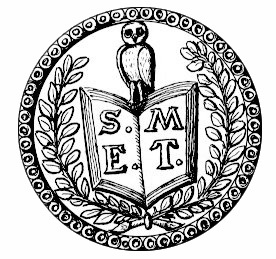
A Minerval Academy was also known as a Church; its
meetings marked on the Illuminati's calendar as sacred.
Above, the
seal of the Freising Minerval Church. Instead of the letters P.M.C.V., they
are replaced with S.E.M.T.: Sigil Ecclesiastic Minerva Thebes; or, "Seal of
the Freising Minerval Church" (i.e. Freising's alias within the Order was
Thebes).
Another layer of the owl symbolism, was to assure its initiates that the
Illuminati does its bidding at night: nocturnal toil (see
Perfectibilists -
The 18th Century Bavarian Order of the Illuminati - 2009, pp.
220-2). It harkens back to the tradition of night being the "mother of
counsels."
Desiderius Erasmus, for instance, recorded the Latin adage:
In nocte consilium [Night is the mother of counsel].
Apparently, the lesson is
to be cautious or prudent, not to undertake a thing impulsively ("sleep on
it"). Indeed, for one of the maxims the Illuminati had given to the Minervals, was: Quidquid agis, age prudente et respice finem [Whatever you
do, do cautiously, and be mindful of the end] (Perfectibilists, op. cit., p.
227 n. 33).
During each Minerval ceremony, the initiates recited, and received a lecture
upon, a translated and slightly altered version of the
Ode to Wisdom by
Elizabeth Carter (1717-1806):
ODE to WISDOM,
By a Lady.
I.
The solitary Bird of Night
Thro' the thick Shades now wings his Flight,
And quits his Time-shook Tow'r;
Where, shelter'd from the Blaze of Day,
In Philosophic Gloom he lay,
Beneath his Ivy Bow'r.
II.
With Joy I hear the solemn Sound,
Which midnight Echoes waft around,
And sighing Gales repeat.
Fav'rite of Pallas! I attend,
And, faithful to thy Summons, bend
At Wisdom's awful Seat.
III.
She loves the cool, the silent Eve,
Where no false Shews of Life deceive,
Beneath the Lunar Ray.
Here Folly drops each vain Disguise,
Nor sport her gaily-colour'd Dyes,
As in the Beam of Day.
IV.
O Pallas! Queen of ev'ry Art,
That glads the Sense, and mends the Heart,
Blest Source of purer Joys!
In ev'ry Form of Beauty bright,
That captivates the mental Sight
With Pleasure and Surprize;
V.
To thy unspotted Shrine I bow:
Attend thy modest Suppliant's Vow,
That breathes no wild Desires;
But taught by thy unerring Rules,
To shun the fruitless Wish of Fools,
To nobler Views aspires.
VI.
Not Fortune's Gem, Ambition's Plume,
Nor Cytherea's fading Bloom,
Be Objects of my Pray'r:
Let Av'rice, Vanity, and Pride,
Those envy'd glitt'ring Toys divide,
The dull Rewards of Care.
VII.
To me thy better Gifts impart,
Each moral Beauty of the Heart,
By studious Thought refin'd;
For Wealth, the Smiles of glad Content,
For Pow'r, its amplest, best Extent,
An Empire o'er my Mind.
VIII.
When Fortune drops her gay Parade,
When Pleasure's transient Roses fade,
And wither in the Tomb,
Unchang'd is thy immortal Prize;
Thy ever-verdant Laurels rise
In undecaying Bloom.
IX.
By Thee protected, I defy
The Coxcomb's Sneer, the stupid Lye
Of Ignorance and Spite:
Alike contemn the leaden Fool,
And all the pointed Ridicule
Of undiscerning Wit.
X.
From Envy, Hurry, Noise, and Strife,
The dull Impertinence of Life,
In thy Retreat I rest:
Pursue thee to the peaceful Groves,
Where Plato's sacred Spirit roves,
In all thy Beauties drest.
XI.
He bad Ilyssus' tuneful Stream
Convey thy Philosophic Theme
Of Perfect, Fair, and Good:
Attentive Athens caught the Sound,
And all her list'ning Sons around
In awful Silence stood:
XII.
Reclaim'd her wild, licentious Youth,
Confess'd the potent Voice of Truth,
And felt its just Controul.
The Passions ceas'd their loud Alarms,
And Virtue's soft persuasive Charms
O'er all their Senses stole.
XIII.
Thy Breath inspires the Poet's Song,
The Patriot's free, unbiass'd Tongue,
The Hero's gen'rous Strife;
Thine are Retirement's silent Joys,
And all the sweet engaging Ties
Of still, domestic Life.
XIV
No more to fabled Names confin'd,
To the Supreme all-perfect Mind,
My Thoughts direct their Flight.
Wisdom's thy Gift & all her force
From thee deriv'd Eternal Source
Of Intellectual Light.
XV
O send her sure, her steady Ray,
To regulate my doubtful Way,
Thro' Life's perplexing Road:
The Mists of Error to controul,
And thro' its Gloom direct my Soul
To Happiness and Good.
XVI
Beneath Her clear discerning Eye
The visionary Shadows fly
Of Folly's painted Show.
She sees thro' ev'ry fair Disguise,
That All but Virtue's solid Joys,
Are Vanity and Woe.
Bohemian Club
[The Bohemian Club's] symbol is an owl, which has been in use since the
first year the Club started. The owl has come to symbolize the wisdom of
life and companionship, that allows humans to struggle with and survive the
cares and frustration of the world. The owl is found on all Bohemian
materials from matchbook covers and doormats to the most elaborate Club
publications.
For $34.00 you can even own an owl-emblemed sports shirt. A
forty foot concrete owl stands at the head of the lake in the Grove. This
owl shrine was built in 1929 to serve as a ceremonial site for traditional
Bohemian rituals and is used yearly for the Cremation of Care Ceremony.
- Peter Martin Phillips
A Relative Advantage: Sociology of the San
Francisco Bohemian Club (1994), p. 44
The Bohemian Club - akin to a new Illuminati of the elite - also pays homage
to the Owl of Minerva/Athena.
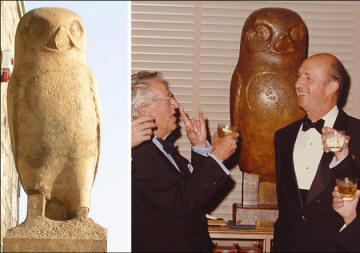
Left, Athenian Owl at the Acropolis — the chief temple dedicated to
Athena/Minerva — in Athens (c. 500 BC)
Right, an exact replica at the
Bohemian Club in San Francisco, which even includes the missing beak
(see Perfectibilists, op. cit., pp. 211-2, 228-9 n. 7)
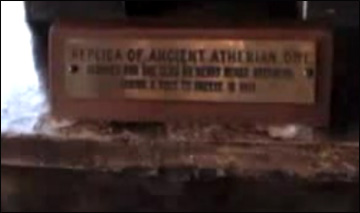
Screen shot from the video "Inside The Bohemian Club"
(below video)
As one can plainly see by the above comparison, the owl statue, situated
within the library at the Bohemian Club headquarters in San Francisco, is an
exact replica of
the one at the Acropolis - thus, there is no doubt that the
"Bohos" (by duplicating a famous statue located at the chief temple
dedicated to Athena) are alluding to Athena/Minerva, or the goddess of
wisdom.
Furthermore, the statue in the Bohemian Club has a plaque on its
front base, stating: "Replica of Ancient Athenian Owl" (see the "Inside The
Bohemian Club" video below).
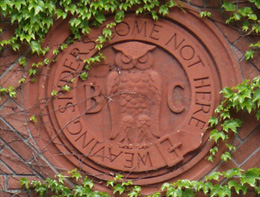
Weavings Spiders
Owl of Minerva
There's also the tale of
Minerva and Arachne (Greek for spider).
It concerns a weaving contest between Minerva -
also known as the goddess of the arts, needle work and weaving - and Arachne.
The latter was turned into a spider after losing the contest.
"Weaving
Spiders Come Not Here," the motto on the seal of the Bohemian Club, may well
be alluding to the myth; the mere fact that it is accompanied by the owl,
which represents Minerva, is significant and noteworthy (and too semiotically sound as to have been a mere coincidence).
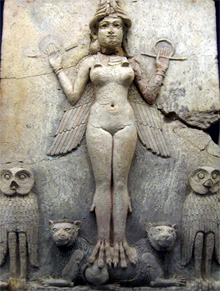
Terracotta (Burney) relief, c.2000-1700 BC
thought to be
Inana/Lilith.
But just because the owl is venerated by the Bohemian Club does not mean
that it is only meant to symbolize Athena/Minerva.
Lilith is also an apt
identification:
-
Lilith (Queen of the Demons), the great screeching owl
mentioned in Isaiah 34:13-16
-
the night owl goddess that inhabits the ruins
of Edom which subsequently became a permanent fixture of Kabbalistic
demonology.
Lilith is also closely related "to the Greek figure of Hecate,
with her demands for human sacrifice," and the Grove participants perform a
mock human sacrifice at the base of a 40-foot owl as part of the Cremation
of Care ritual.
In addition, the poet
George Sterling, one of the most
prominent "Bohos" of his time, wrote a play titled
Lilith - A Dramatic Poem
(1920), in which Lilith herself mentions the owl - demonstrating that they
at least knew of such symbolism.
Sterling stayed at the Bohemian Club in his
own private room toward the end of his life, where he committed suicide by
ingesting cyanide.
Schlaraffia
Founded in Prague, Bohemia, 1859, thirteen years before the Bohemian Club,
the
Schlaraffia were initially composed of actors, artists, literati and
musicians (much like the Bohemian Club); and they too (like the Bohemian
Club) have an owl as their totem.
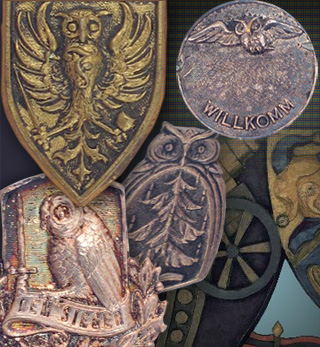
Schlaraffia paraphernalia
The society of men, which is called Schlaraffia, is in the strict sense, a
fraternity.
Its clubs are spread all over the world and can be found on each
continent. Artists and academicians in Prag (Prague), which was considered
at the time the Mekka (Mecca) of German culture, founded the Schlaraffia
society in 1859. Its aim was to offset the chauvinistic and egotistic
behavior of the nobility, and to create a hideout for men from the exertions
and worries of the profane life. The Society's maxims consist of fostering
art, humor and friendship.
An actor by the name of Victor Mueller-Fabricius founded the club in
Cincinnati in 1893. Almost the whole Symphony Orchestra of Cincinnati joined
the Society at that time. The name of the Cincinnati settlement is
Schlaraffia Cincinnatia. The official language used during meetings and
correspondence is German.
Many customs and some semantics of medieval times are used at the sessions,
since Schlaraffia maintains its relationship to civic societies of the
Medieval Age.
During the meetings that occur weekly during the winter months and less
often during summer months, attendees listen to lectures prepared by
speakers on such topics as problems of technique, art and literature. The
lectures are followed by discussions where much wit and humor are usually
exchanged.
The place of the Schlaraffia assemblies is called Burg. In Cincinnati, the
Burg is the former Steuben House on Rohs Street in Clifton.
The Society venerates the owl, called UHU in German, as the emblem of
wisdom. The owl was honored at the times of the Antike (Greek and Roman
antiquity) as the representative of prudence and wisdom. Of the three goals
of Schlaraffia, the most important one is the sincere friendship that glues
the membership together and obligates each Schlaraffe to provide mutual aid
and assistance according to his potential.
(Source)
There was a branch of
Schlaraffia instituted in San Francisco as early as
1884, so there is the possibility of real connections and influence among
the two groups.
Similar to the Bohemian Club's concept of destroying "Care" ("the release of
everyday mundane concerns for the brotherhood of Bohemian friendship"
[Phillips, op. cit., p. 46]), the Schlaraffia say: "As soon as he [the
Schlaraffian] enters a 'castle' [or 'Temple'] and comes under the rule of
Uhu, the great horned owl of Minerva, he is expected to forget all foolish
things of everyday life."
While researching the espionage of
Aleister Crowley, author and historian
Richard B. Spence came across some intriguing connections to Schlaraffia.
Spence found that both George Sylvester Viereck and Hugo Muensterberg were
members of Schlaraffia.
In Secret Agent 666 - Aleister Crowley, British
Intelligence and the Occult, p. 71, Spence writes:
While replete with Masonesque ritual and symbolism, it lacked heavy occult
overtones. On the other hand, Schlaraffia shared membership with more
esoteric groups such as Sat B'hai and the Royal Order of Sikha, the former
one of the constituent orders of the OTO. So, there may have been more going
on than met the uninitiated eye.
British and American intelligence
identified Schlaraffia as a "Secret German Propaganda Society" that
encouraged artists and writer to "spread German propaganda in a silent,
secret way." At the least, Schlaraffia provided a ready-made, secret,
Germanophile organization with branches throughout the country - an ideal
vehicle for espionage and other activities.
James Gordon Bennett Jr.
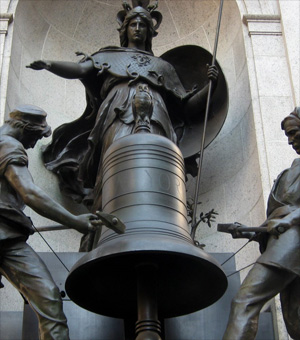
While these
secret societies venerate the owl as
the ultimate symbol of wisdom, there are other cases of outright obsession.
Minerva and the Bell Ringers at Herald Square is dedicated to James Gordon
Bennett (1795-1872), founder of the New York Herald, and to his son James
Gordon Bennett, Jr. (1841-1918). After his father's death, Bennett Jr. took
the reigns of the Herald, whose original masthead sported an owl.
Minerva
and the Bell Ringers were initially situated on the roof of the New York
Herald building on 35th Street and 6th Avenue.
Empire State Building & Vicinity
New York City, New York Bell Ringers
Monument
(James Gordon Bennett Memorial)
This group of figures was commissioned for the roof of the New York Herald's
two-story headquarters on 35th Street and Sixth Avenue.
Athena (or Minerva), goddess of wisdom, holds her shield and spear with her
left hand as she gestures commandingly at the two men named Stuff and Guff,
below. On the hour, the men swing back their hammers and pretend to strike
the bell, but stop three inches short. The hour is actually struck by a
mechanism tucked behind Stuff and Guff. Originally, it was hand-wound, and
each winding took 240 turns and took two to three hours to set Minerva for a
week. Now it is electric. On top of the bell sits Athena's bird, the owl,
whose eyes blinked green when the owl and Athena were on top of the Herald's
headquarters.
The inscription below the figures notes that this is a memorial to James
Gordon Bennett, founder of the New York Herald in 1835, and his son James
Gordon Bennett, 'through whose vision and enterprise the New York Herald
became one of the world's great newspapers.'
James Gordon Bennett, Jr., moved the headquarters of the Herald from its
original location on Park Row (near 'Printer's Square,' where the Benjamin
Franklin statue now stands) uptown to a Renaissance-palazzo-style building
designed by Stanford White. (The Building was demolished in 1921.) Before
working people owned watches, the Herald Tribune's tolling clock was relied
upon to tell time in the Herald Square area.
The artist was the Beaux-Arts trained-sculptor Jean Antoine (Antonin) Carles
(1851-1919). The figures and bell were cast in France by 'SIOI - Decauille,
Foundeur Paris' and shipped to New York.
(Source)
Apparently, the Herald headquarters had its roof surrounded with twenty-six,
"owls, each four feet high...The eye sockets of the owls contained electric
globes, which at night flashed on and off, winking to the passers-by below,
perhaps giving the message that owlish wisdom was being disseminated in the
newspaper plant."
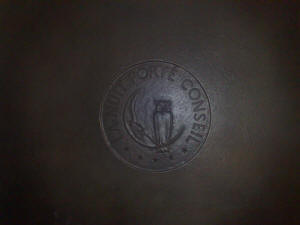
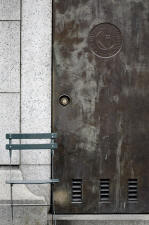
La Nuit Porte Conseil
Comp culled from these pics (Flickr users "selva" and "wwward0")
The New York Times writes that there's
"a bronze door accessing the interior
of the monument near 35th Street. It is inscribed with five stars, an owl
and the legend 'La Nuit Porte Conseil,' which has been translated
idiomatically from the French as 'Let's sleep on it.'"
Indeed, for it was
Bennett's personal motto, and it's identical to the one mentioned above (in
the Illuminati section) - In nocte consilium.
His compulsive identification with owls was pathological.
Bennett Jr.,
"kept
live owls in his office as a symbol of wisdom"
was "a disciple of owls, and
had them painted on the panels of his house, yacht, and bathrooms"
"...owls
everywhere: owls engraved on all his cuff-links, live owls in the garden of
the Villa Namouna at Beaulieu"
"luminescent owl's eyes on either side
of the prow" of his 314-foot yacht,
Lysistrata.
He even had extravagant
plans for a gigantic owl tomb, 125-feet tall and perched on a 75-foot
pedestal; his coffin would have been lowered into the owl's head, suspended
midway by chains.
The edifice was to be constructed in Washington Heights,
and the architect - he'd hoped - would have been Stanford White.
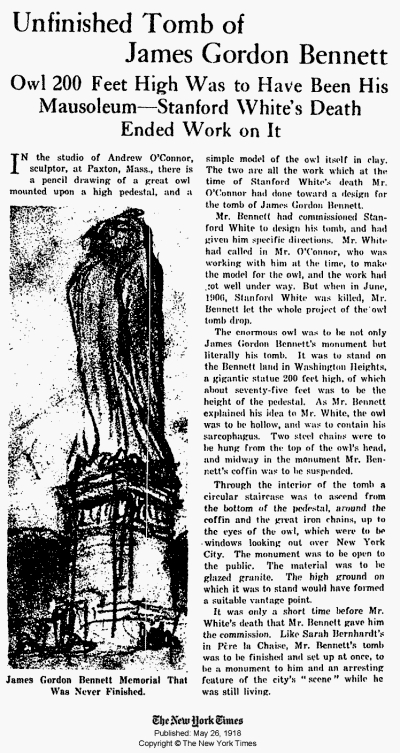
Unfinished Tomb of James Gordon Bennett
Owl 200 Feet High Was to Have Been
His Mausoleum
Stanford White's Death Ended Work on It











